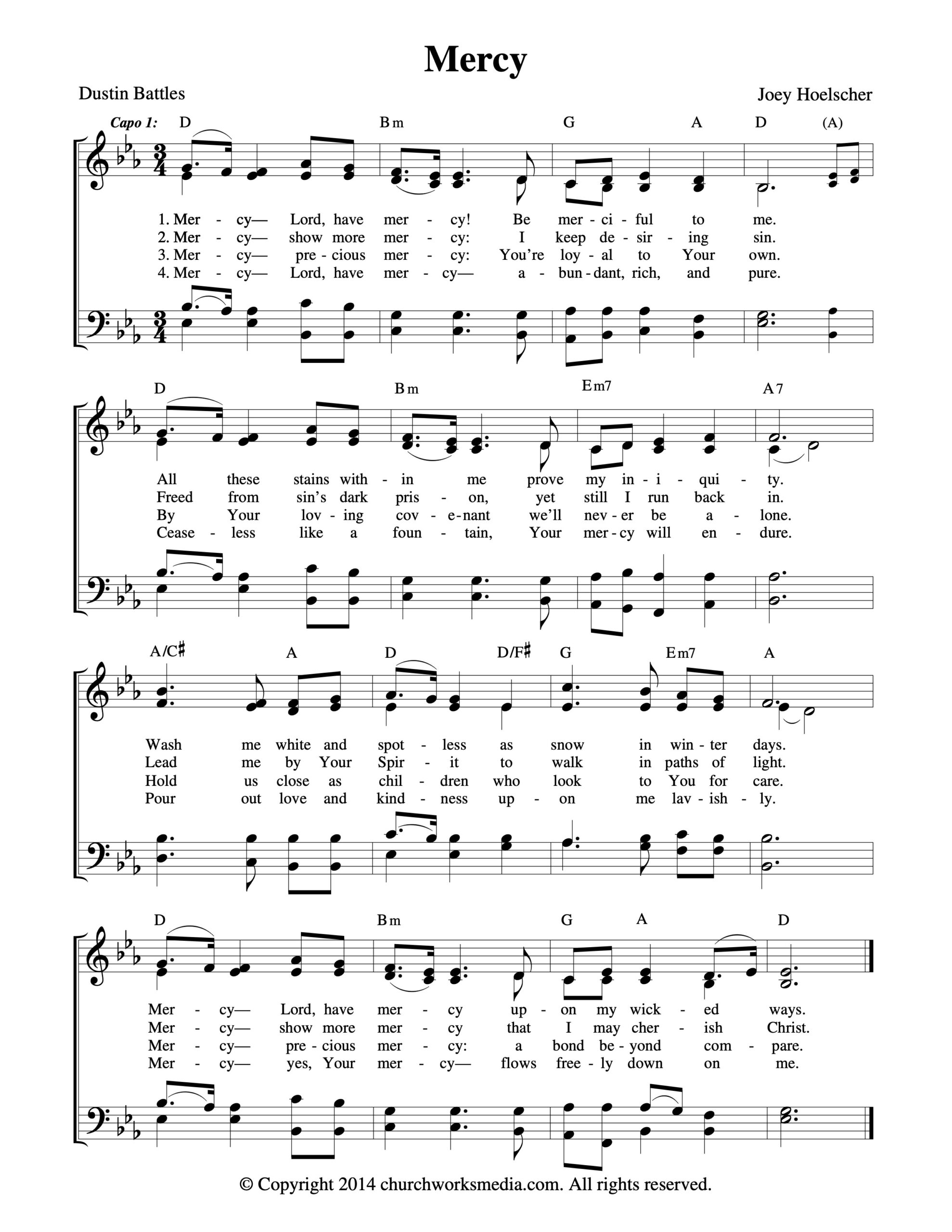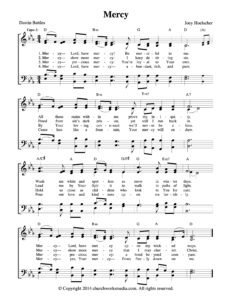Mercy [free song]
$0.00
Words by Dustin Battles; Music by Joey Hoelscher
Please note: This is a free download. You can download the files after checkout with just your name and email.
❤️ If you benefit from our free products, please consider giving a donation. Thanks!
MERCY
Words by Dustin Battles; Music by Joey Hoelscher
Mercy—Lord, have mercy! Be merciful to me.
All these stains within me prove my iniquity.
Wash me white and spotless as snow in winter days.
Mercy—Lord, have mercy upon my wicked ways.
Mercy—show more mercy: I keep desiring sin.
Freed from sin’s dark prison, yet still I run back in.
Lead me by Your Spirit to walk in paths of light.
Mercy—show more mercy that I may cherish Christ.
Mercy—precious mercy: You’re loyal to Your own.
By Your loving covenant we’ll never be alone.
Hold us close as children who look to You for care.
Mercy—precious mercy: a bond beyond compare.
Mercy—Lord, have mercy—abundant, rich, and pure.
Ceaseless like a fountain, Your mercy will endure.
Pour out love and kindness upon me lavishly.
Mercy—yes, Your mercy—flows freely down on me.
© 2014 Church Works Media. All rights reserved.
_______
DOCTRINAL NOTES
by Dustin Battles
Because God delights in worship that is biblical, thoughtful and passionate—what we often call intentional—please consider the following overview of the biblical texts and doctrinal themes behind the hymn “Mercy”:
I originally wrote the text of “Mercy” as a metricized psalm of Psalm 51—hence the tune name PSALM 51. But as I fleshed out the themes of mercy, covenant love, and loyalty other Scripture passages kept coming to mind. Other passages so perfectly fit into the the theme of love and mercy, such as Romans 7-8 and Hosea 2, as well as other verses such as Psalm 23:6 and Psalm 40:11.
Stanza 1 begins with a plea for the Lord’s mercy. That general plea is followed by a more personal plea: “God be merciful to me.” That is, as the reader/singer progresses through the first line, he realizes that mercy is necessary, not just in general, but from a holy God to him—a sinner. The reason for this is found in line two, where he realizes the depths of his sin as he gazes within his own heart and sees his iniquity. He then calls out to God to wash him white and pristine as snow in winter days.
Stanza 2 addresses the believer’s continual struggle against indwelling sin—for these battles rage until the end of life. Inspired by a sermon of J. D. Crowley on Romans 7 and 8, I illustrate that despite being freed from prison, we still desire to run back in. The reader/singer then pleads with God that he would be led by the Spirit into paths of light, not back into the dark prison. His desire is that he might cherish Christ above all.
Stanza 3 expresses what most consider the definition of the Old Testament mercy: the Hebrew word ḥeseḏ—that is, covenant loyalty. Through studying the book of Hosea and reading Michael Barrett’s book, Love Divine and Unfailing (P&R, 2008), I was shocked by the divine display of mercy. In this covenant of mercy those who once were called Not My People are now called My People, and those who were once called No Mercy are now shown mercy (Hosea 2:16–23). This mercy—a covenant loyalty—is a bond beyond compare.
Stanza 4 expresses the desire for God’s mercy to be shown in both quality and quantity. His cry is that God’s mercy would be pure and rich in quality, as well as lavish and eternal in quantity. We can be certain that God’s mercy will endure, just like a ceaseless fountain. Psalm 23:6 and Psalm 40:11 show that God’s mercy will endure until our final breath on this earth.
| Included files: |
Full page hymn (with guitar chords) |
|---|




